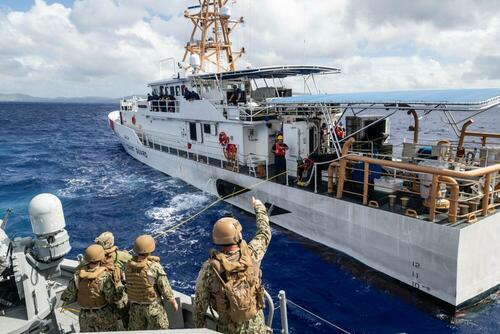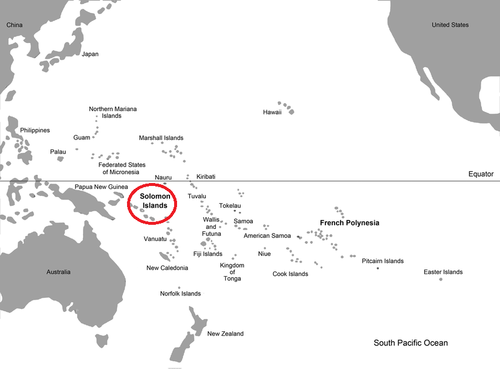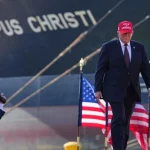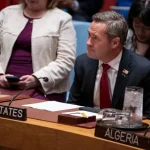
At a moment the Solomon Islands continues pursuing deeper ties with China, and following a bilateral security cooperation agreement between the two countries signed in April which set off alarm bells in Washington, the island nation is taking the unprecedented decision to deny US military vessels the ability to dock.
The US Coast Guard said in an official statement on Friday that its vessel, the USCG Oliver Henry was denied a "routine logistics port call" by the Solomon Islands government. The US statement didn't indicate the precise day that the port call request was rejected.

Authorities "did not respond to the US government’s request for diplomatic clearance for the vessel to refuel and provision" in the capital city of Honiara, said the Coast Guard - which in prior years had been normative and easily granted. The vessel had reportedly been on patrol in South Pacific waters looking for illegal fishing at the request of a regional fisheries agency.
Following the denial, which is somewhat unprecedented and now being widely interpreted as a sign of deepened security ties and cooperation with China, the State Department said it put the Solomon Islands on notice and in the future expects "all future clearances will be provided to US ships." The Coast Guard cutter was further described as "part of a patrol headed south to assist partner nations in upholding and asserting their sovereignty while protecting US national interests."
Currently the US and Chinese navies are jockeying to assert competing visions of what constitutes territorial vs. international waters in the South China Sea and elsewhere in the South Pacific. This is especially a tense issue at the moment near Taiwan.
Regarding the Taiwan issue, and a huge indicator of increasing Chinese influence over the Solomons, which has been going on for years, the tiny island-chain country had switched its diplomatic relations and formal recognition from Taipei and Beijing starting in 2019. US officials also close watched large-scale and at times violent anti-corruption protests break out in 2021 - which many observers said was sparked by Beijing's growing reach in the country's internal affairs.
All of this was the lead-in to what Western officials and pundits dubbed a "secretive" April 1st security pact, summarized and described by the US government institution and think tank United States Institute of Peace as follows:
A leaked draft of a Solomon Islands-China security agreement has led to heightened concern over the island nation’s turn toward China. Washington dispatched a high-level delegation in late April to the island nation, days after China said the pact had been signed, saying it would "intensify engagement in the region."
The United States and its regional partners, particularly Australia and New Zealand, are worried about the potential of Chinese military bases on the islands, although the details of the agreement remain vague — which is itself a source of concern. As part of its Indo-Pacific Strategy, the Biden administration aims to advance a free and open Indo-Pacific, an objective that could be complicated by China’s prospective new arrangement with Solomon Islands.
The prime minister of the Solomon Islands Manasseh Sogavare sought to reassure his population (and Western leaders) in mid-July remarks, saying there is no intent to ever allow a Chinese military base in his country, which could make "our people as targets for potential military strikes" - akin to what played out there between global powers in WWII.
But he did say at the time that he remains open to Chinese security personnel acting under a peace-keeping mission to be deployed to the islands, in the scenario where the "security partner of choice" Australia couldn't meet these commitments.
At a moment the Solomon Islands continues pursuing deeper ties with China, and following a bilateral security cooperation agreement between the two countries signed in April which set off alarm bells in Washington, the island nation is taking the unprecedented decision to deny US military vessels the ability to dock.
The US Coast Guard said in an official statement on Friday that its vessel, the USCG Oliver Henry was denied a “routine logistics port call” by the Solomon Islands government. The US statement didn’t indicate the precise day that the port call request was rejected.

Authorities “did not respond to the US government’s request for diplomatic clearance for the vessel to refuel and provision” in the capital city of Honiara, said the Coast Guard – which in prior years had been normative and easily granted. The vessel had reportedly been on patrol in South Pacific waters looking for illegal fishing at the request of a regional fisheries agency.
Following the denial, which is somewhat unprecedented and now being widely interpreted as a sign of deepened security ties and cooperation with China, the State Department said it put the Solomon Islands on notice and in the future expects “all future clearances will be provided to US ships.” The Coast Guard cutter was further described as “part of a patrol headed south to assist partner nations in upholding and asserting their sovereignty while protecting US national interests.”
Currently the US and Chinese navies are jockeying to assert competing visions of what constitutes territorial vs. international waters in the South China Sea and elsewhere in the South Pacific. This is especially a tense issue at the moment near Taiwan.
Regarding the Taiwan issue, and a huge indicator of increasing Chinese influence over the Solomons, which has been going on for years, the tiny island-chain country had switched its diplomatic relations and formal recognition from Taipei and Beijing starting in 2019. US officials also close watched large-scale and at times violent anti-corruption protests break out in 2021 – which many observers said was sparked by Beijing’s growing reach in the country’s internal affairs.
All of this was the lead-in to what Western officials and pundits dubbed a “secretive” April 1st security pact, summarized and described by the US government institution and think tank United States Institute of Peace as follows:
A leaked draft of a Solomon Islands-China security agreement has led to heightened concern over the island nation’s turn toward China. Washington dispatched a high-level delegation in late April to the island nation, days after China said the pact had been signed, saying it would “intensify engagement in the region.”
The United States and its regional partners, particularly Australia and New Zealand, are worried about the potential of Chinese military bases on the islands, although the details of the agreement remain vague — which is itself a source of concern. As part of its Indo-Pacific Strategy, the Biden administration aims to advance a free and open Indo-Pacific, an objective that could be complicated by China’s prospective new arrangement with Solomon Islands.
The prime minister of the Solomon Islands Manasseh Sogavare sought to reassure his population (and Western leaders) in mid-July remarks, saying there is no intent to ever allow a Chinese military base in his country, which could make “our people as targets for potential military strikes” – akin to what played out there between global powers in WWII.
But he did say at the time that he remains open to Chinese security personnel acting under a peace-keeping mission to be deployed to the islands, in the scenario where the “security partner of choice” Australia couldn’t meet these commitments.








